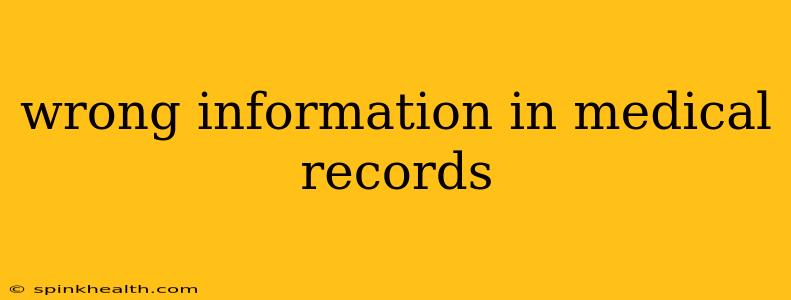The hushed reverence of a doctor's office, the sterile scent of a hospital—these places hold immense trust. We entrust our well-being, our very lives, to the professionals within those walls. But what happens when that trust is shattered? What happens when a simple, seemingly insignificant error in our medical records casts a long, dark shadow over our health and future?
It's a story more common than we might like to believe. A wrong entry in medical records, whether a misdiagnosis, a medication error recorded, or an incorrect allergy noted, can have cascading consequences, impacting everything from treatment plans to insurance claims and even our emotional wellbeing. This isn't just about a misplaced decimal point; this is about the potential for real, tangible harm.
What Happens When There's Wrong Information in Medical Records?
The ramifications of inaccurate medical information can be wide-ranging and deeply troubling. Let's explore some of the key consequences:
Incorrect Diagnoses and Treatment Plans:
Imagine this: you're experiencing persistent chest pain. Your doctor, relying on a medical record that incorrectly states you've never smoked, might overlook certain diagnostic possibilities. This incorrect information, a simple oversight, could lead to a delayed diagnosis of a serious condition, potentially worsening your prognosis.
Medication Errors and Adverse Reactions:
A misplaced comma, a hastily scribbled note—these seemingly minor errors can have life-threatening consequences. If your allergy to penicillin is missing from your record, for instance, an unsuspecting doctor might prescribe it, resulting in a severe allergic reaction. This isn't hypothetical; it’s a tragically real possibility.
Insurance Claim Disputes and Denied Coverage:
Inaccurate medical records can lead to frustrating battles with insurance companies. Incorrect coding, missing information, or outright errors can cause claims to be denied, leaving patients facing unexpected and substantial medical bills. The stress and financial burden are immense.
Emotional Distress and Loss of Trust:
Beyond the practical consequences, wrong information in medical records can erode trust in the healthcare system. Patients may feel anxious, vulnerable, and betrayed by the very professionals they depend on. This breach of trust can significantly impact their mental and emotional well-being.
How Can Wrong Information End Up in Medical Records?
Several factors contribute to errors in medical records:
Human Error:
Let's face it, humans make mistakes. A rushed appointment, a busy shift, or simply a moment of distraction can lead to errors in data entry, misinterpretation of test results, or inaccurate documentation.
Poor Communication:
Ineffective communication between healthcare providers can also lead to inaccuracies. If vital information isn't properly relayed between specialists, the overall picture becomes fragmented and prone to errors.
Systemic Issues:
Outdated or poorly designed electronic health record (EHR) systems can contribute to data entry errors. Complex systems that lack user-friendly interfaces can make it difficult to input and manage information accurately.
What Can You Do if You Discover Incorrect Information?
Discovering an error in your medical record is unsettling, but proactive steps can mitigate the harm:
- Contact the Provider: Immediately inform the healthcare provider or facility that made the error. Request a correction and documentation of the change.
- Review Your Records Regularly: Take an active role in managing your health information. Regularly review your records to identify and correct any inaccuracies.
- File a Complaint: If the error is serious or the correction isn't handled appropriately, consider filing a formal complaint with the appropriate regulatory bodies.
Conclusion: Vigilance is Key
The integrity of medical records is paramount. While errors can happen, their potential consequences are too severe to ignore. Vigilance, clear communication, and a proactive approach to managing our health information are essential in protecting ourselves from the perilous path of a wrong entry. Your health, your story, deserves to be accurately recorded.

